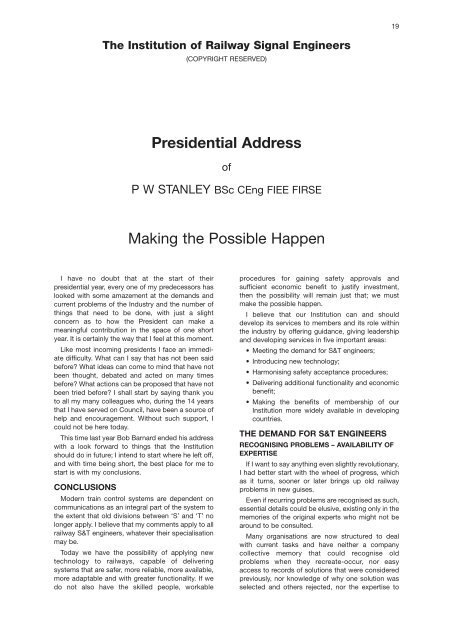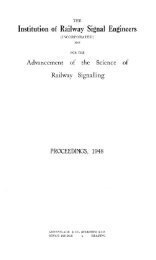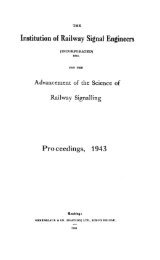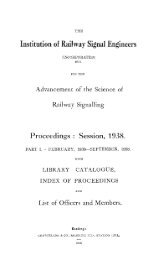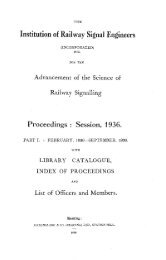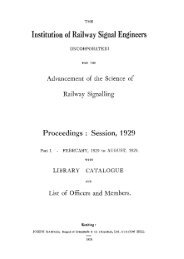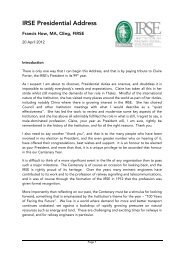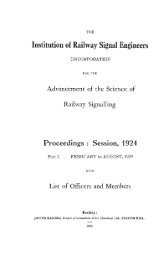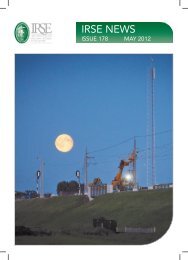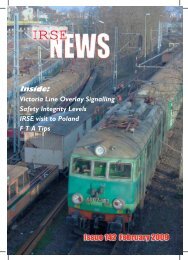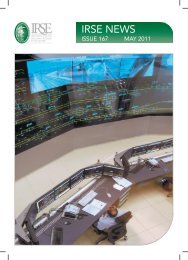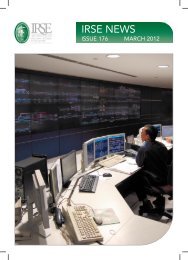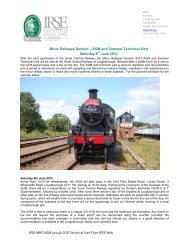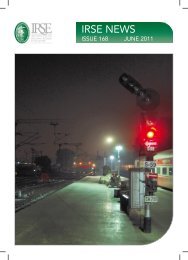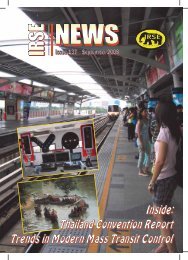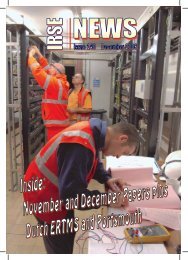Proceedings 2002/2003 - IRSE
Proceedings 2002/2003 - IRSE
Proceedings 2002/2003 - IRSE
Create successful ePaper yourself
Turn your PDF publications into a flip-book with our unique Google optimized e-Paper software.
19<br />
The Institution of Railway Signal Engineers<br />
(COPYRIGHT RESERVED)<br />
Presidential Address<br />
of<br />
P W STANLEY BSc CEng FIEE F<strong>IRSE</strong><br />
Making the Possible Happen<br />
I have no doubt that at the start of their<br />
presidential year, every one of my predecessors has<br />
looked with some amazement at the demands and<br />
current problems of the Industry and the number of<br />
things that need to be done, with just a slight<br />
concern as to how the President can make a<br />
meaningful contribution in the space of one short<br />
year. It is certainly the way that I feel at this moment.<br />
Like most incoming presidents I face an immediate<br />
difficulty. What can I say that has not been said<br />
before? What ideas can come to mind that have not<br />
been thought, debated and acted on many times<br />
before? What actions can be proposed that have not<br />
been tried before? I shall start by saying thank you<br />
to all my many colleagues who, during the 14 years<br />
that I have served on Council, have been a source of<br />
help and encouragement. Without such support, I<br />
could not be here today.<br />
This time last year Bob Barnard ended his address<br />
with a look forward to things that the Institution<br />
should do in future; I intend to start where he left off,<br />
and with time being short, the best place for me to<br />
start is with my conclusions.<br />
CONCLUSIONS<br />
Modern train control systems are dependent on<br />
communications as an integral part of the system to<br />
the extent that old divisions between ‘S’ and ‘T’ no<br />
longer apply. I believe that my comments apply to all<br />
railway S&T engineers, whatever their specialisation<br />
may be.<br />
Today we have the possibility of applying new<br />
technology to railways, capable of delivering<br />
systems that are safer, more reliable, more available,<br />
more adaptable and with greater functionality. If we<br />
do not also have the skilled people, workable<br />
procedures for gaining safety approvals and<br />
sufficient economic benefit to justify investment,<br />
then the possibility will remain just that; we must<br />
make the possible happen.<br />
I believe that our Institution can and should<br />
develop its services to members and its role within<br />
the industry by offering guidance, giving leadership<br />
and developing services in five important areas:<br />
• Meeting the demand for S&T engineers;<br />
• Introducing new technology;<br />
• Harmonising safety acceptance procedures;<br />
• Delivering additional functionality and economic<br />
benefit;<br />
• Making the benefits of membership of our<br />
Institution more widely available in developing<br />
countries.<br />
THE DEMAND FOR S&T ENGINEERS<br />
RECOGNISING PROBLEMS – AVAILABILITY OF<br />
EXPERTISE<br />
If I want to say anything even slightly revolutionary,<br />
I had better start with the wheel of progress, which<br />
as it turns, sooner or later brings up old railway<br />
problems in new guises.<br />
Even if recurring problems are recognised as such,<br />
essential details could be elusive, existing only in the<br />
memories of the original experts who might not be<br />
around to be consulted.<br />
Many organisations are now structured to deal<br />
with current tasks and have neither a company<br />
collective memory that could recognise old<br />
problems when they recreate-occur, nor easy<br />
access to records of solutions that were considered<br />
previously, nor knowledge of why one solution was<br />
selected and others rejected, nor the expertise to


